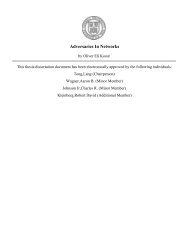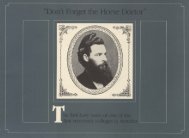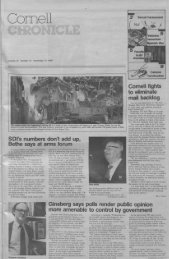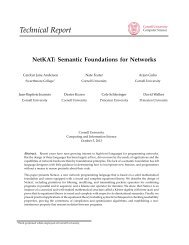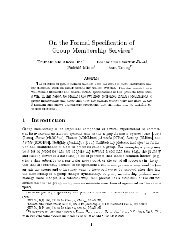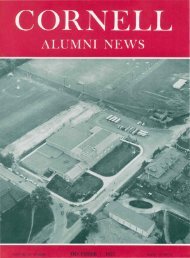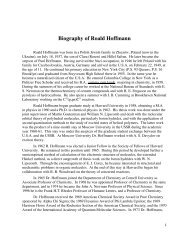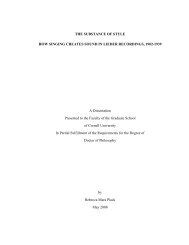Cornell Alumni News - eCommons@Cornell - Cornell University
Cornell Alumni News - eCommons@Cornell - Cornell University
Cornell Alumni News - eCommons@Cornell - Cornell University
You also want an ePaper? Increase the reach of your titles
YUMPU automatically turns print PDFs into web optimized ePapers that Google loves.
There is also a question of numbers. If one uses graduate<br />
students as teaching assistants during one-fourth of their<br />
time at <strong>Cornell</strong>, then that means that only one-fourth of<br />
the 3,500 students are teaching assistants at any one time.<br />
As we operate courses now, that's not quite enough. All<br />
of these are areas that we can change and will try to change,<br />
in the direction of making all graduate students who could<br />
profit by teaching experience and who would do a good job<br />
of teaching, a part of the group from whom teaching assistants<br />
are selected.<br />
Q. What has been the reaction of the departments to this<br />
proposal of more teaching time for all graduate students?<br />
A. Well, it's been mixed. Some departments, a dozen or<br />
more, have made a stipulation that a PhD in that department<br />
will not be given unless the student has done some<br />
teaching in that area.<br />
Q. Is there a large financial disparity between a teaching<br />
assistant and a research assistant?<br />
A. No. We thought there was, but our research indicates<br />
there is not. There are individual problems, but, on the average,<br />
the teaching assistant is paid at least as well as the<br />
research assistant. Also, the research assistant typically has<br />
an easier time of being supported during the summer than<br />
the teaching assistant. So one of the aims we have in mind<br />
is to attempt to provide summer support for the teaching<br />
assistant either in doing research or in fellowship support<br />
during the summer. And we have not, by any means, solved<br />
that problem yet. [See Ford grant story, page 29.]<br />
Q. Is there uniformity at <strong>Cornell</strong> in the supervision of<br />
teaching assistants?<br />
A. No. Each professor does it differently. One of the<br />
most interesting developments in this area is the plan which<br />
Professor Walter LaFeber has employed in his introductory<br />
'Actually, there are<br />
plenty of small<br />
classes . . .<br />
The difficulty is<br />
that they are not<br />
distributed well.'<br />
American history course. This course, by the way, no longer<br />
treats history in the traditional chronological manner and<br />
is another example of an improvement in undergraduate<br />
education which went on independently of the Commission.<br />
In this course, the professor lectures on the first day of the<br />
week. The second time the class meets each week, the<br />
teaching assistant is present along with a professor who is<br />
drawing out the students in provocative ways, dealing with<br />
the subject matter, talking about competing interpretations,<br />
developing a sense that all is not cut and dried. At the last<br />
session of the week, the teaching assistant by himself deals<br />
with the class and further develops the question of interpretation,<br />
getting the students themselves involved.<br />
Q. Are the number of students in each of these classes<br />
the same as the sequence you just described?<br />
A. No. The first is all of the students together in a lecture<br />
with a thoroughly prepared, rather formal, lecture by the<br />
history professor who is most competent in that particular<br />
area of subject matter. The second and third classes are in<br />
small sections.<br />
Q. A great deal of financial support for graduate students<br />
comes from outside the university, usually foundations or<br />
the Federal government. Do they place restrictions on the<br />
use of graduate students as teachers?<br />
A. Yes. An agency giving a fellowship so that the student<br />
can work full time is not attuned to the idea that he<br />
should spend half his time teaching. On the other hand, the<br />
agencies have begun to take a more flexible position, and<br />
many of us have been working with the agencies to try to<br />
get them to take an even more flexible position. One of the<br />
curiosities in this respect has been the Woodrow Wilson<br />
Fellowship, the purpose of which is to bring more distinguished<br />
students into the teaching profession. However, the<br />
Woodrow Wilsons, for the first year, at least, of their graduate<br />
careers are not allowed to teach. We're moving in two<br />
directions simultaneously. We hope to make up packages of<br />
graduate student support, such as a first year as a Woodrow<br />
Wilson Fellow, later years under other fellowship support,<br />
and a year or two as a teaching assistant. We're also trying<br />
to get the federal agencies to take a somewhat more flexible<br />
attitude towards part time teaching. National Science<br />
Foundation fellows can now spend some small fraction of<br />
their time teaching and this turns out to be a very useful<br />
thing, indeed.<br />
Q. You mention the unique use of teaching assistants in<br />
Professor LaFeber's class. Are there others worth noting?<br />
A. We have uncovered a great deal of imagination and a<br />
lot of different ways in which teaching assistants are factored<br />
into the teaching process. One area that the commission<br />
has examined is the development of apprenticeship<br />
programs. Under such a program a fellowship holder in the<br />
second year of his graduate study might, during the spring<br />
of that year, work part time for perhaps only an hour or<br />
two a week with the professor with whom he will be teaching<br />
in the fall. This enables him to make a smooth and<br />
gradual transition from being a fellowship holder to being<br />
a teacher in his own right. This is an area we would like to<br />
explore further to see whether the experience of some professors,<br />
who have been trying this approach, could be extended<br />
into a larger sphere.<br />
Q. Has there been any attempt to teach the teaching assistants<br />
to teach?<br />
A. There have been courses like this. Dean Mauritz<br />
Johnson of the School of Education has a seminar in the<br />
spring term which meets once a week and has drawn in the<br />
past some fifty or more people, most of whom have been<br />
teaching assistants. This has been more for giving perspective<br />
on college teaching than for instruction in teaching.<br />
May 1967 21




